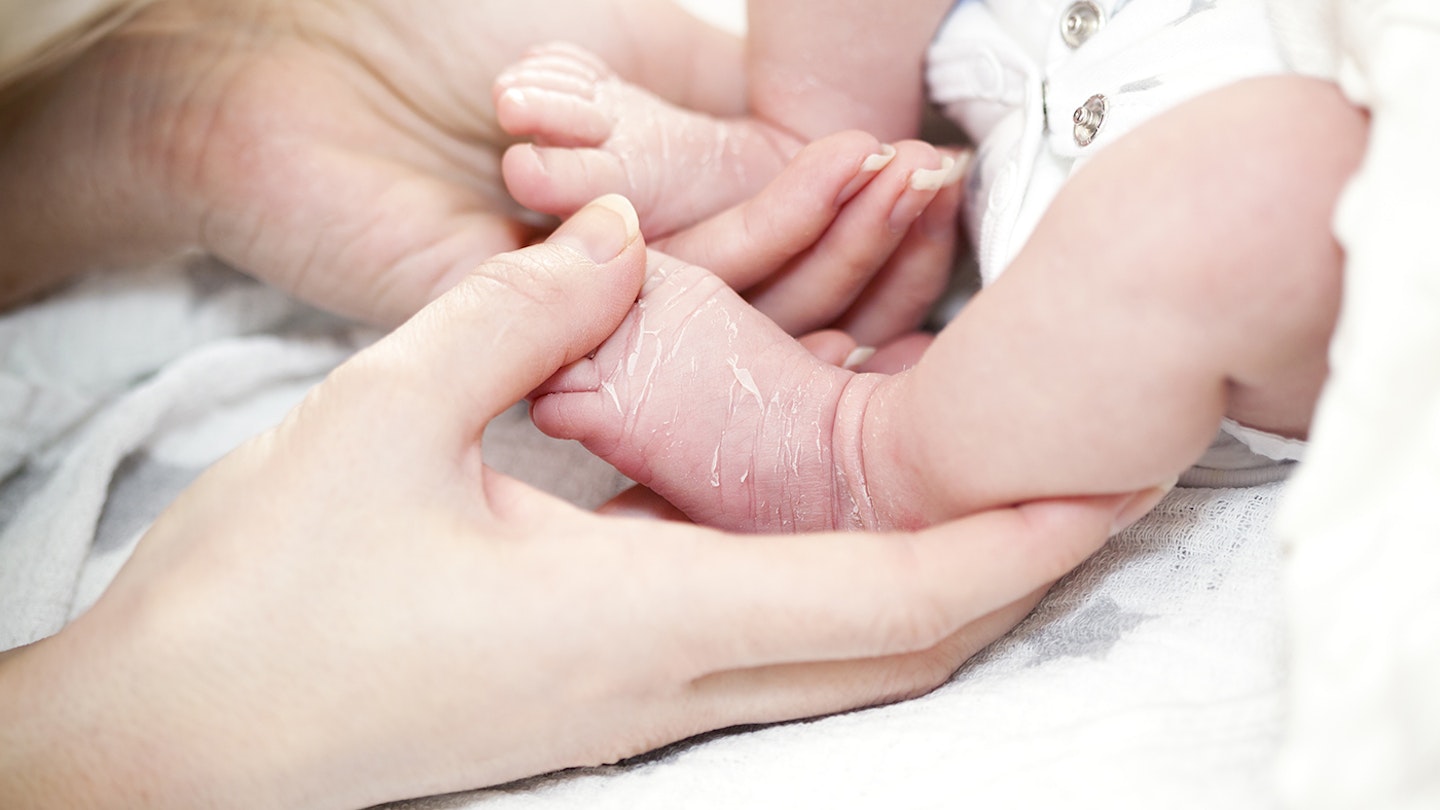There is nothing lovelier than the feel – and smell – of your newborn’s soft skin. So, if it starts appearing flaky or you notice your newborn's skin peeling it can be worrying.
The good news is this is a normal process, but it's important to note that newborn skin is incredibly delicate, so you have to look after it in the right way.
Your new baby has possibly the softest skin ever, and keeping their skin in good condition so they're comfortable should be high on your list – it's the body's biggest organ after all. From how often you should bathe your newborn, to when to use baby bath products, to baby washing powder and how to recognise the signs of skin issues such as baby eczema, here's everything you need to know about caring for newborn skin. In the first few months, it’s all about a ‘less is more’ policy.
Why is my newborn's skin peeling?
Your baby is born with skin that seems a bit wrinkly and with a sort of waxy coating. This is completely normal and is a protective covering called vernix. This 'second skin' may look white or creamy, and it's there to help your newborn's skin adapt to life outside the womb. It acts as a barrier to water loss, helps with temperature regulation, and gives protection against infection.
How much vernix your baby has will differ from newborn to newborn, it develops around 20 weeks of pregnancy and helps baby to move within the uterus. By week 36-38 this vernix layer will be a lot thicker. It all comes down to timing, if your baby is born prematurely they will have less vernix, and if they're born around 40 weeks you'll probably only find vernix in skin creases.
Whether your little one has a lot of vernix or a little, it's important to leave this layer to absorb into the skin naturally. Don’t try and wash it off – it’s a brilliant moisturiser.
What can you put on newborn peeling skin?
Newborn skin is incredibly delicate and thin as the immune system is still developing, so go product free for the first 28 days. Barrier cream is the exception.
Once your baby has passed this date, small amounts of mild baby bath products that are free from colours, alcohol and strong perfumes can be introduced, but it’s best to be very sparing, or steer clear of products altogether for the first few months.
A gentle moisturiser, particularly after bathing, can help to lock back in moisture. Look for something hypoallergenic, specifically designed for newborn baby skin.
Recognising skin conditions
Newborns are prone to a number of skin conditions including rashes, baby acne and cradle cap. A lot of rashes that appear on your baby’s skin are irritations from their new surroundings, they can even develop from someone holding them who is wearing perfume.
These problems tend to self-soothe and disappear within a few days – it’s just your baby getting used to the outside world. Of course, if anything remains and seems really angry then visit your doctor.
Eczema
If peeling skin comes with irritation and red dry patches of skin, it could be a sign of eczema or atopic dermatitis. This is rare in newborns, but could develop a few months after birth. Fortunately there are many eczema creams for babies so you're sure to find one that will help soothe your little one's skin.
Cradle cap
This is another common cause of baby's skin peeling, that causes greasy, flaky crusts on a baby's scalp. It can develop as early as 3 weeks, but normally clears up on its own. With a cradle cap shampoo, you can help to alleviate the symptoms.
The first bath
There is no set time to give your baby theirfirst bath. Some people prefer to wait until the umbilical cord stump falls off and the belly button heals. Or you may feel comfortable to give your baby sponge baths, concentrating on cleaning baby’s bottom and mouth areas, also known as topping and tailing, before this point.
The NHS advice is "It's best to bath your baby with plain water only for at least the first month. Do not add cleansers to your baby's bath water or use skin lotions or medicated wipes."
You can bath your baby two or three times a week but there is no need to use baby products or shampoo. Your newborn doesn’t require the same level of washing that you do. When you do start using shampoos and bubble bath just remember less is more.
Avoiding irritants
Laundry detergent
There is no need to separate your baby’s washing from yours, as your baby will have built up a tolerance to whatever washing detergent you use while in the womb. But if you use a laundry powder you should rinse baby's clothes afterwards to avoid any flakes which may irritate your infants skin. Liquid detergents rinse out more completely so there's no need to rinse with these.
Or you can opt for a baby washing powder or detergent. Look out for non-bio products and wash new baby clothes before you use them.
Heat and cold
Protecting your baby's skin from the elements will help prevent it from drying out. Cover your baby's skin with light garments and a hat in the summer, and avoid the hottest parts of the day. In winter make sure extremities like hands and feet are covered.
